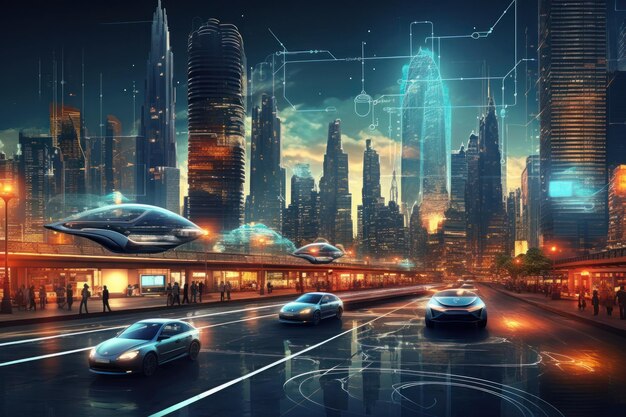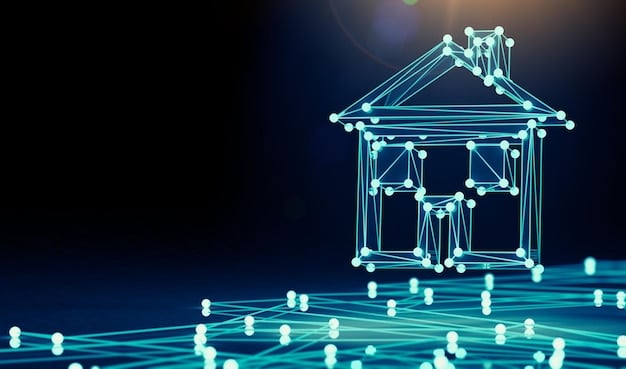The Future of Real Estate: Trends & Tech Shaping 2025

The future of real estate in 2025 will be significantly shaped by emerging trends and technologies, including artificial intelligence, blockchain, sustainable building practices, and virtual reality, transforming how properties are bought, sold, managed, and experienced.
The realm of the future of Real Estate: Emerging Trends and Technologies Shaping the Industry in 2025 promises phenomenal transformations. As we stand on the cusp, understanding these influential factors isn’t just advantageous, it’s fundamental for anyone involved in the property market.
The Rise of PropTech and AI in Real Estate
PropTech, a fusion of property and technology, is rapidly evolving, driven by advancements in artificial intelligence (AI). By 2025, AI is anticipated to be even more deeply integrated into every facet of the real estate industry.
AI’s impact ranges from automating mundane tasks to providing insightful data analysis. It is transforming how real estate professionals operate and how consumers experience property transactions.
AI-Powered Property Management
AI systems are becoming adept at managing properties efficiently. These systems can automate tasks such as rent collection, maintenance scheduling, and tenant screening.
Furthermore, AI algorithms are capable of predicting potential maintenance issues before they arise, reducing costs and improving tenant satisfaction.
AI in Property Valuation and Investment
AI algorithms analyze vast datasets to provide accurate property valuations and investment recommendations. This technology allows investors to make informed decisions quickly and efficiently.
With AI, analyzing market trends, comparing property values, and identifying investment opportunities has become significantly more sophisticated.
- Improved Property Valuations: AI algorithms offer more accurate and data-driven property valuations.
- Enhanced Investment Strategies: AI helps investors identify profitable opportunities and manage risks effectively.
- Automated Property Management: AI streamlines tasks, reducing operational costs and improving efficiency.
- Better Tenant Experiences: AI enhances communication and service delivery, leading to increased satisfaction.
In conclusion, AI and PropTech are set to revolutionize the real estate sector, offering enhanced efficiency, improved decision-making, and better customer experiences. Embracing these technologies will be crucial for staying competitive in the future.
Blockchain Technology and Secure Transactions
Blockchain technology, known for its security and transparency, is poised to transform real estate transactions by 2025. Its decentralized nature offers enhanced security and efficiency in property deals.
By mitigating fraud and streamlining transactions, blockchain could significantly reduce the time and costs associated with buying and selling property.

Smart Contracts for Real Estate
Smart contracts, self-executing agreements written into code and stored on a blockchain, can automate various aspects of real estate transactions. These contracts ensure that all parties fulfill their obligations automatically.
Smart contracts can handle tasks such as transferring ownership, distributing funds, and managing rental agreements, all without the need for intermediaries.
Tokenization of Real Estate Assets
Tokenization involves converting real estate assets into digital tokens on a blockchain. This process makes it easier to buy, sell, and trade real estate, opening up investment opportunities to a broader audience.
Tokenization allows fractional ownership, enabling investors to purchase a portion of a property, which was previously only accessible to high-net-worth individuals.
- Increased Transaction Transparency: Blockchain provides an immutable record of all transactions, enhancing trust and security.
- Reduced Transaction Costs: Automation through smart contracts lowers administrative costs and eliminates intermediaries.
- Greater Liquidity: Tokenization allows for fractional ownership, increasing the liquidity of real estate assets.
- Faster Transaction Times: Blockchain technology speeds up property transactions, reducing the time it takes to close deals.
In summary, blockchain’s secure and transparent nature is set to revolutionize real estate transactions. By embracing smart contracts and tokenization, the industry can improve efficiency, reduce costs, and attract a wider range of investors.
Sustainable Building Practices and Green Real Estate
By 2025, sustainability will be a core consideration in real estate. Environmentally conscious consumers and stricter regulations are driving the adoption of green building practices.
Green real estate not only minimizes environmental impact but also offers significant long-term benefits, including reduced operating costs and enhanced property values.
Energy-Efficient Designs and Materials
Energy-efficient designs and materials are essential for creating sustainable buildings. Features such as solar panels, energy-efficient windows, and advanced insulation systems are becoming standard.
These designs reduce energy consumption, lowering utility bills and carbon emissions.
Smart Home Technologies for Sustainability
Smart home technologies play a crucial role in managing energy consumption within buildings. Smart thermostats, lighting systems, and appliance controls optimize energy use based on occupancy and environmental conditions.
These technologies can also monitor and report energy usage, providing valuable insights for further improvements.
- Reduced Environmental Impact: Green building practices minimize carbon emissions and conserve natural resources.
- Lower Operating Costs: Energy-efficient designs and materials reduce utility bills and maintenance expenses.
- Increased Property Value: Sustainable buildings are highly sought after, commanding premium prices in the market.
- Healthier Living Environments: Green buildings often incorporate features that improve indoor air quality and overall well-being.
Sustainable building practices are transforming the real estate industry, offering environmental, economic, and social benefits. As consumers become increasingly conscious of their carbon footprint, green real estate will become an increasingly valuable asset.
Virtual and Augmented Reality (VR/AR) Experiences
Virtual reality (VR) and augmented reality (AR) technologies are revolutionizing how people experience real estate. By 2025, VR and AR are expected to be integral to property marketing, sales, and management.
These technologies provide immersive and interactive experiences, allowing potential buyers and tenants to explore properties remotely and visualize design options.
Virtual Property Tours
VR-powered virtual property tours offer potential buyers and tenants the ability to explore properties from anywhere in the world. These tours provide a realistic and engaging experience, allowing users to walk through rooms, view details, and get a feel for the space.
Virtual tours save time and resources by pre-qualifying leads and reducing the need for in-person showings.
AR for Interior Design and Visualization
AR applications allow users to visualize furniture placement, paint colors, and other design options within a physical space. This technology is invaluable for both buyers and tenants who want to customize their living environments.
AR tools can also assist real estate professionals in showcasing the potential of a property, making it easier for clients to make informed decisions.

- Enhanced Property Marketing: VR and AR provide immersive experiences that engage potential buyers and tenants.
- Streamlined Sales Process: Virtual tours and AR visualization tools save time and resources by qualifying leads and reducing the need for in-person showings.
- Improved Customer Satisfaction: These technologies empower clients to make informed decisions and customize their living environments.
- Increased Property Value: Properties that incorporate VR and AR experiences are seen as innovative and tech-savvy, attracting more interest.
VR and AR technologies are set to transform the real estate industry, creating more engaging and informative experiences for buyers, tenants, and real estate professionals alike. Embracing these technologies will be crucial for staying ahead in a competitive market.
The Impact of Remote Work on Real Estate Demands
The shift toward remote work is reshaping real estate demands, prompting changes in where people choose to live and work. By 2025, the impact of remote work on real estate is expected to be even more pronounced.
As more companies adopt flexible work policies, individuals are seeking homes that can accommodate their professional and personal needs, leading to new trends in housing preferences and urban planning.
Increased Demand for Suburban and Rural Properties
With the rise of remote work, the demand for properties in suburban and rural areas is increasing. People are seeking larger homes with more space for home offices, outdoor activities, and privacy.
Suburban and rural properties offer a better quality of life, lower costs of living, and closer access to nature, making them attractive alternatives to urban centers.
Reimagining Urban Spaces
As remote work reduces the need for daily commutes to urban offices, cities are beginning to reimagine their spaces. Adaptive reuse projects are converting vacant office buildings into residential units, co-working spaces, and community centers.
This trend is revitalizing urban areas, creating vibrant mixed-use neighborhoods that cater to the evolving needs of residents.
- Changing Housing Preferences: Remote work is driving demand for larger homes with dedicated office spaces.
- Suburban and Rural Growth: More people are moving to suburban and rural areas in search of a better quality of life.
- Urban Revitalization: Cities are adapting to remote work by converting office spaces into residential and community hubs.
- Increased Investment Opportunities: The shift toward remote work is creating new investment opportunities in suburban and rural real estate.
Remote work is transforming the real estate landscape, influencing where people choose to live and how cities are adapting to changing needs. Adapting to these trends will be essential for real estate professionals and urban planners seeking to create thriving communities.
Personalization and Customization in Real Estate
Personalization and customization are becoming key factors in real estate. Consumers are increasingly seeking properties that reflect their unique lifestyles and preferences.
By 2025, technology will play an even greater role in enabling personalization, from customized home designs to smart home features tailored to individual needs.
Customizable Home Designs
Advances in design technology allow buyers to customize home designs to their specific requirements. Online platforms and 3D modeling tools enable clients to collaborate with architects and builders to create personalized floor plans, layouts, and exterior designs.
This level of customization ensures that homes are not only aesthetically pleasing but also perfectly suited to the owners’ lifestyles.
Smart Home Features Tailored to Individual Needs
Smart home technology is making it easier to personalize living environments. Smart lighting, temperature control, security systems, and entertainment options can be tailored to individual preferences.
These technologies can also learn and adapt to users’ habits, providing automated comfort and convenience.
- Enhanced Customer Satisfaction: Personalization ensures that homes meet the specific needs and preferences of the occupants.
- Increased Property Value: Customizable and smart homes are highly desirable, commanding premium prices in the market.
- Improved Living Experience: Customization enhances comfort, convenience, and overall quality of life.
- Data-Driven Customization: Technology provides insights into homeowners’ preferences, enabling ongoing personalization and improvements.
The growing demand for personalization is transforming the real estate industry. By embracing customization in design and technology, real estate professionals can create homes that offer unparalleled comfort, convenience, and satisfaction.
| Key Trend | Brief Description |
|---|---|
| 🤖 AI & PropTech | AI enhances property management, valuation, and investment strategies. |
| 🔒 Blockchain | Blockchain secures transactions and enables tokenization of assets for greater liquidity. |
| 🌿 Sustainability | Green building practices reduce environmental impact and operating costs. |
| 👓 VR/AR | VR and AR offer immersive property tours and design visualizations. |
FAQ
▼
AI algorithms analyze vast datasets to provide more accurate and data-driven property valuations, improving investment decisions and reducing risks for buyers and sellers.
▼
Blockchain enhances transaction security and transparency, reduces costs by eliminating intermediaries, and enables fractional ownership through tokenization, increasing liquidity for real estate assets.
▼
Sustainability is crucial due to increasing environmental awareness, stricter regulations, and the economic benefits of reduced operating costs and enhanced property values associated with eco-friendly buildings.
▼
VR and AR offer immersive property tours and design visualizations, enabling potential buyers and tenants to explore properties remotely and customize living environments, saving time and improving satisfaction.
▼
Remote work is driving demand for suburban and rural properties with larger homes and dedicated office spaces, while also prompting the revitalization of urban areas through adaptive reuse projects.
Conclusion
As we look towards 2025, the future of real estate is being reshaped by advancements in technology, increased sustainability efforts, and shifting consumer preferences. By embracing these changes, industry professionals can unlock new opportunities and create value for buyers, sellers, and communities alike.





